Georgia Transport Guide: Marshrutka Madness
Georgia is a very well-connected country. Trains connect major cities, and marshrutkas largely pick up the slack for getting you to other locations around the country. You’ll be able to find train timetables online, but marshrutka timings are a mystery unless you speak to locals or other travellers that have taken the same route.
Before we got to Georgia, I had read a lot of less than shining reviews of Georgian drivers, in particular marshrutka drivers.
Were our experiences as terrifying as the reviews had made out that they would be? Absolutely not, not even close. And we took loads of marshrutkas all around the country over six (ish) months.
Our experiences were largely positive, but there definitely were some hair-raising moments, bouts of serious motion sickness, and times where we nearly fell out of our seats. But, you know, it’s all part of the authentic Georgian experience, and really, you haven’t properly been to Georgia if you haven’t had at least one marshrutka ride!
This Georgia transport guide will help you prepare for the marshrutka madness on your next trip to this astounding country.
Georgia Transport Guide: Marshrutka Madness
How well-connected are the cities?
When should I get to the bus station?
Are there marshrutka stations?
Which Tbilisi stations should I to?
How do I find the Right Marshrutka?
What if I need to get out before the final destination?
So what’s the situation with luggage?
How uncomfortable is a marshrutka journey?
So what is a marshrutka?
A marshrutka is essentially a minivan. You generally find them in ex-Soviet republics – the Stans, the Caucasus and some in Eastern Europe. They travel a set route from A to B, have very little leg room or luggage space and are usually the cheapest transport option.

How well-connected are the cities?
If you are in Tbilisi, you will be able to get a direct route to almost anywhere in the country. If you’re in Batumi or Kutaisi, you will (more or less) be able to get anywhere in the west of the country. For other smaller locations, you will largely be able to get to other relatively nearby locations. So for example, you’re in Kutaisi and you want to get to Telavi in the very east: you will have to go to Tbilisi and change marshrutka. All roads quite literally lead to Tbilisi.
Where can I find timetables?
Now, this is a tricky one because timetables don’t really exist online. There isn’t anything official, but you’ll be able to find information for your next destination once you are at the bus station. Your other option is to ask locals, check with your accommodation host, or read up on articles like ours about destinations in Georgia. Basically, you need to find people in the know.
We have had many accommodation hosts in smaller towns or villages literally call the driver to check timings. I guess there is maybe one guy who services the route.
When should I get to the bus station?
As a rule of thumb, we plan to get there twenty/thirty minutes early. This is a rule that we have stuck to throughout our travels so far and it works pretty nicely. It means you have time to find the right marshrutka and get your luggage packed up before others have arrived. However, it all depends on the rules of the specific marshrutka.
Every marshrutka, bar one, that we have taken in Georgia (and we’ve travelled around the country for near on six months) has left at a designated time. Some, however, just leave when they are full, or when they have enough money from the passengers to make it worth them taking the journey.
We took a marshrutka from Zugdidi up to Mestia that was meant to leave around 12, that actually ended up leaving at 10:45. The only reason we arrived this early was because I had read up online that the Zugdidi Mestia marshrutkas leave when full, so we got there an hour and a half early. Good job we did this!
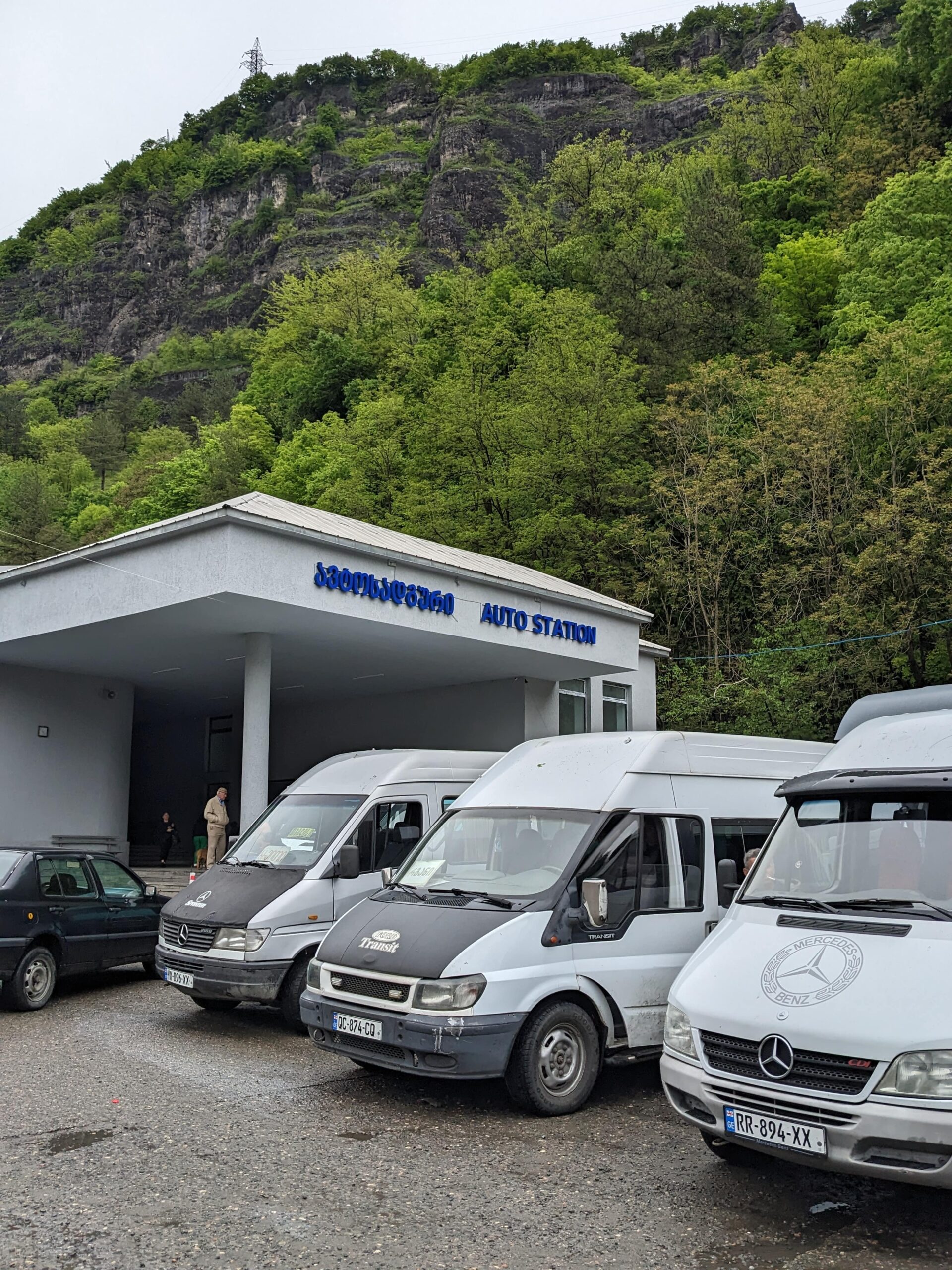
Are there marshrutka stations?
So where do you get the marshrutka from? The bus station. Georgia doesn’t really have many intercity buses or coaches. But the stations from which you get your marshrutka are referred to as ‘bus stations’, even though they are really marshrutka stations. Some cities will have a bus station that is just a couple of marshrutkas parked up at the side of the road, others are absolute mayhem like Didube in Tbilisi. You will usually be able to find the bus station locations on Maps.me or Google Maps, but not always. If in doubt, just ask around: Georgians are really helpful and friendly.

Which Tbilisi station should I go to?
Tbilisi was the only city we came across that had several different stations servicing different areas of the country, so bear that in mind.
Marshrutkas leaving from Didube head to most of the country. If you’re going to Kazbegi, Mtskheta, Gori, Borjomi, and further west in the country: head to Didube.
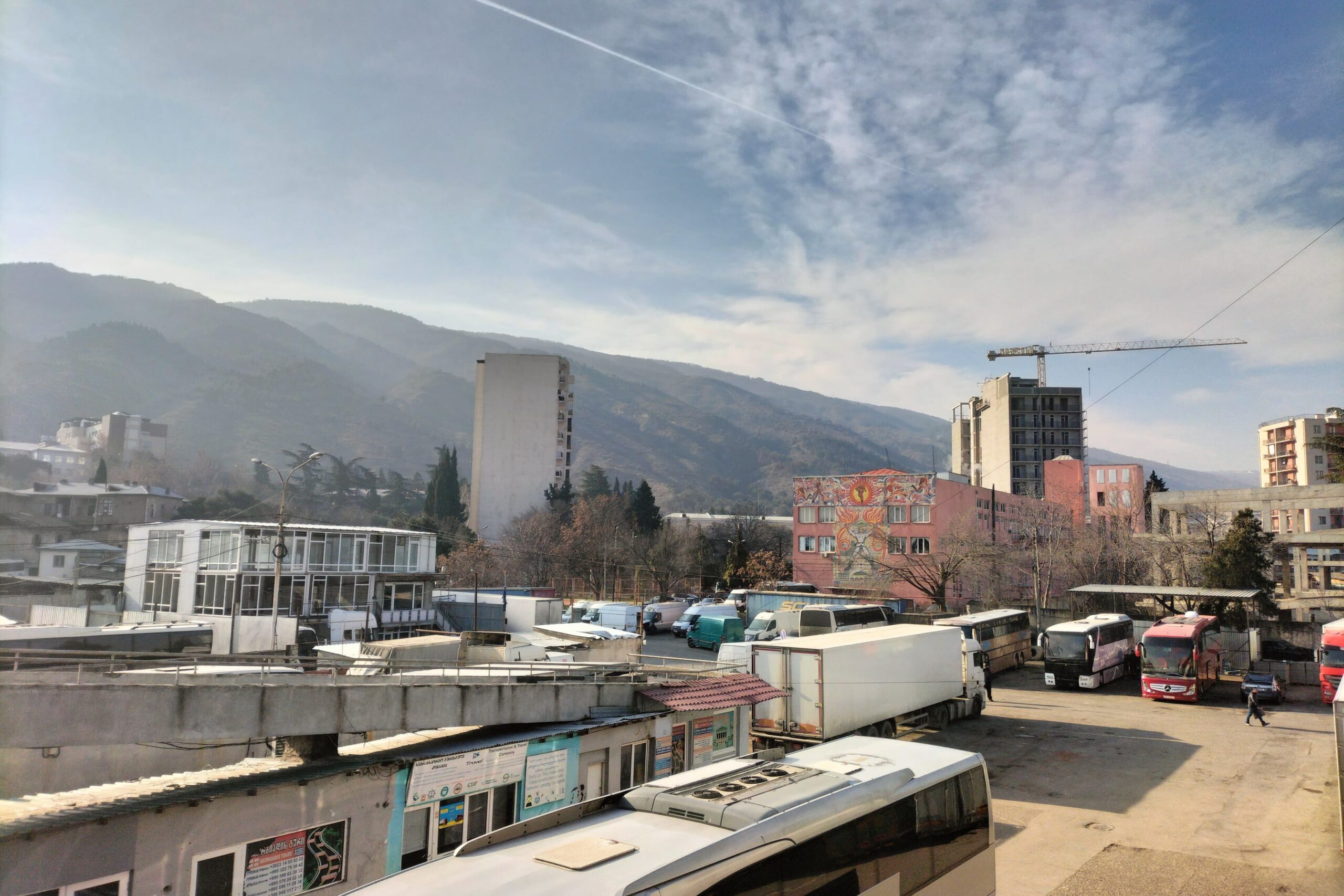
If you are heading to anywhere in the Kakheti region or over to the east, these marshrutkas leave from Ortachala. Some people may tell you to pick it up from Isani, but that’s not actually where the marshrutkas depart from: they just stop here to pick people up. So, if you have luggage, want to secure yourself a seat, or are just unsure about flagging down a marshrutka, go to Ortachala ahead of time instead. The closest metro station is called Isani. From here, it is a twenty minute walk downhill to Ortachala.
These are the two stations that service the majority of the country, but there are also other odd places around Tbilisi. For example, we have seen signs for marshrutkas to Mestia leaving from the car park in front of Tbilisi Central Train station. If in doubt, ask a local. Didube and Ortachala are absolutely nowhere near each other, so you don’t want to go to the wrong one by accident.
How do I find the right marshrutka?
Marshrutkas have a sign in the windscreen showing the final destination. But depending on how touristy your destination is, depends on whether it is shown in Georgian or English. Heading to Gori or Batumi: easy, they will show in English. Heading to Duisi or Chiatura: not so easy, they will show in Georgian.
When you enter the bus station, people will inevitably approach you to find out if you are planning on getting their marshrutka. Say your destination, and they will point you in the right direction. In our experience, even taxi drivers (who obviously want you to take their transport instead of the marshrutka) have pointed us to the right vehicle. Follow it up with a ‘madloba!’, which means ‘thank you’ in Georgian.
Top tip: learn how to properly pronounce your destination, and take a screenshot of how it is written in the Georgian alphabet. Marshrutka drivers tend not to have a great understanding of English.

How do I pay for the ride?
Now this can vary, but the common factor is that you will always have to pay in cash. Sometimes, you have to pay at a ticket desk at the bus station, and then show the driver the ticket. Sometimes, you pay the driver in cash when you get on the marshrutka at the bus station. Sometimes, and this is the most common, you just pay the driver when you get off the marshrutka. Try to have more or less correct change for the driver. Paying for a 5 GEL trip with a 100 GEL note won’t go down too well. If one of the first two options are required, the driver will let you know.
How much does a journey cost?
Really not much at all. Travelling by marshrutka is the cheapest way (bar hitchhiking) to get around the country. An hour long trip to Gori, cost us 5 GEL. A four and a half hour mountain road trip up to Mestia cost us 40 GEL. The most expensive that we have seen advertised is Mestia to Tbilisi at 50 GEL, but that is literally a journey from one end of the country to the other, so it’s not bad at all.
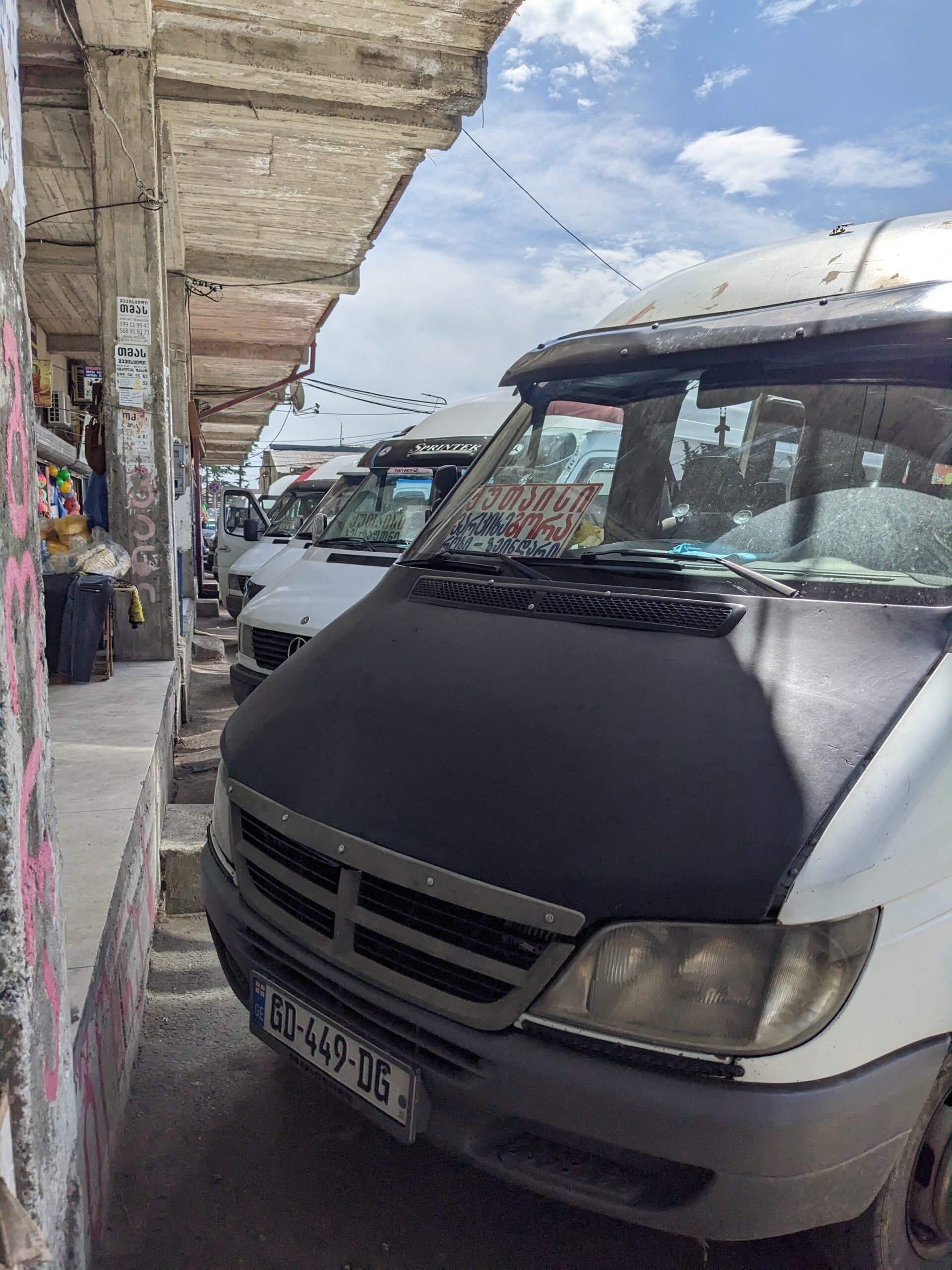
What if I need to get out before the final destination?
The marshrutka is driven a specific route, and you can get on or off at any point along this route. Just get out of your seat and tell the driver when you want to get off. We took a marshrutka from Ozurgeti, heading to Batumi, but got off half way at Kobuleti. We have even got out early because the marshrutka route was right past our accommodation, so instead of stopping at the bus station, we just jumped out five minutes early.
If you know the route that the marshrutka takes, you can even stand at the side of the road and just flag it down as it comes past. This is a little riskier though, purely because there might not be seats available. And if you have large backpacks like ours, it means it can cause some awkwardness as you try to squeeze into the already small marshrutka with them (you might get some disapproving looks!).
So what’s the situation with luggage?
This is where it can get awkward. Marshrutkas generally only have a tiny space behind the last row of seats to store luggage. Your bag will either be slid under the last row of seats or squeezed between the back of the seat and the back door. Sometimes though, there might be other people with luggage too, or the marshrutka might be dropping products off to someone en route (therefore no luggage space!). In this circumstance, get ready to do some jiggery pokery to get your bag in a position that doesn’t block the way for everyone else in the marshrutka. (I have genuinely had situations where I have had my knees round my ears, and had to have my 20 kg backpack on my knees for a full journey in Armenia. But that’s a story for another time.) For popular routes, Kutaisi to Mestia as an example, the marshrutka might have an extension that they attach to the back of the vehicle. You don’t have to pay extra for your luggage.
My advice is to pack light when visiting Georgia!
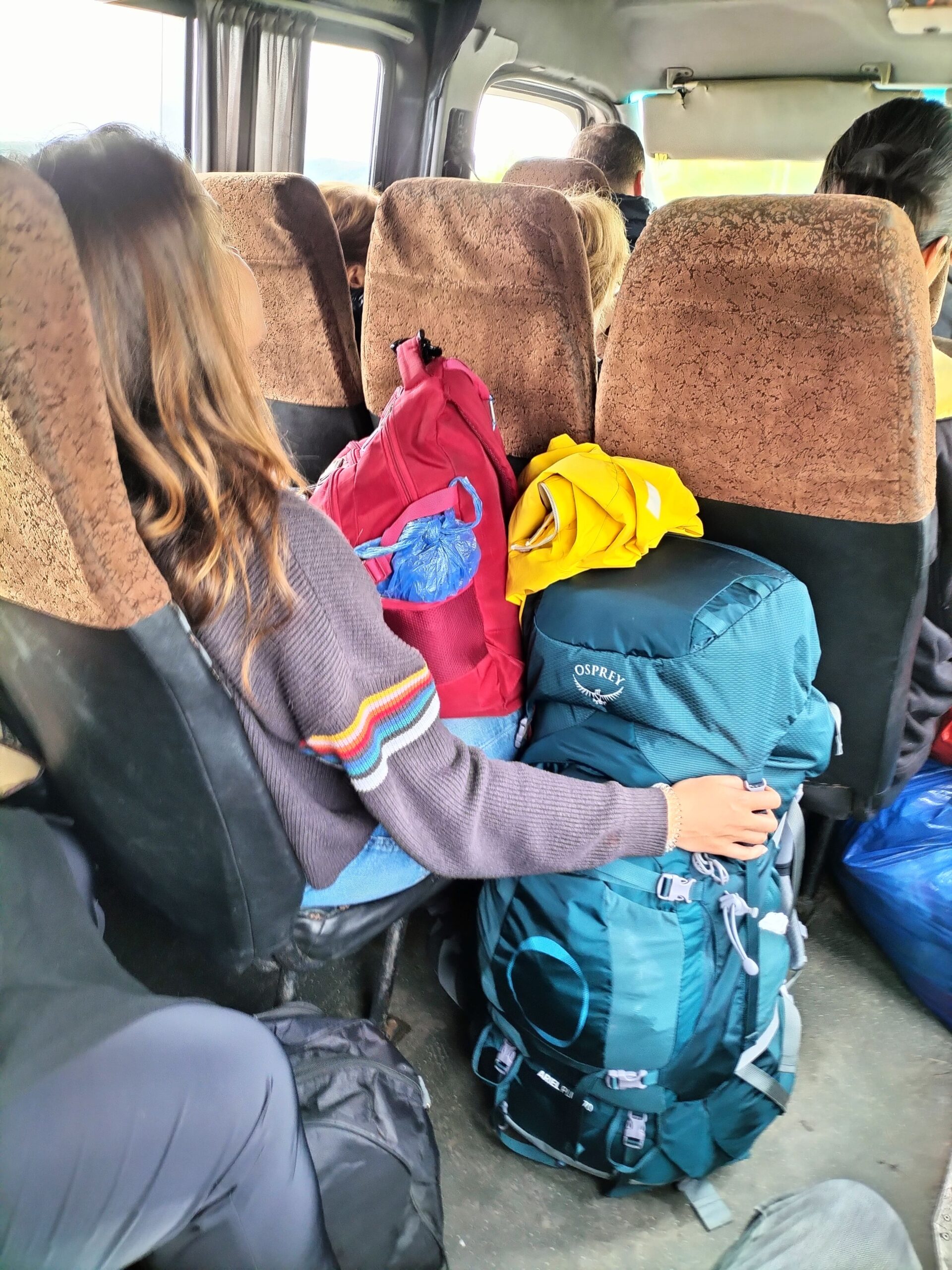
How uncomfortable is a marshrutka journey?
I guess it really depends on how long your legs are! I, at about 5’6’’, have no issues with leg room. Chris at 6’2’’ish usually has more difficulty and has to put his legs out into the aisle. Get prepared to get cosy with the other passengers, is my advice. Even when the seats are all full, the marshrutka will stop along the route to pick up others. There is always space for more in a marshrutka, even if it means standing. Marshrutkas are great for shorter journeys – maybe up to three hours. Anything longer, and I would recommend trying to get the train.
What is the road safety like?
So, marshrutka drivers go pretty quickly, and Georgian drivers overall aren’t the most cautious. There aren’t seatbelts in marshrutkas so hold on tight. Marshrutka journeys down winding mountain roads are the most difficult to stomach; we both ended up feeling ill and we don’t really get motion sickness.
Have you taken a marshrutka in Georgia? What was your experience?
I’d love to hear your thoughts, recommendations and questions.
Thanks for reading!
Like it? Save it!
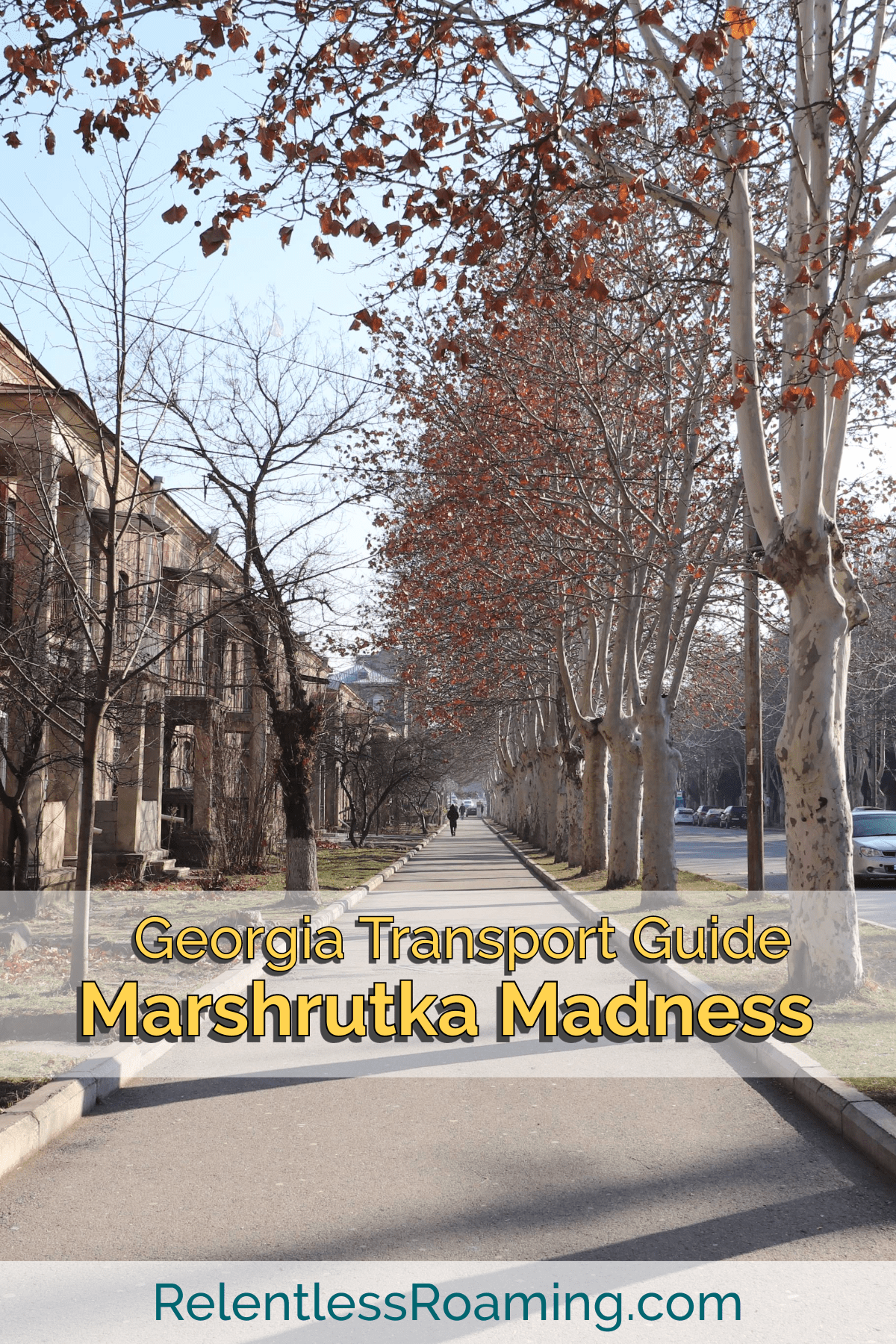

0 Comments